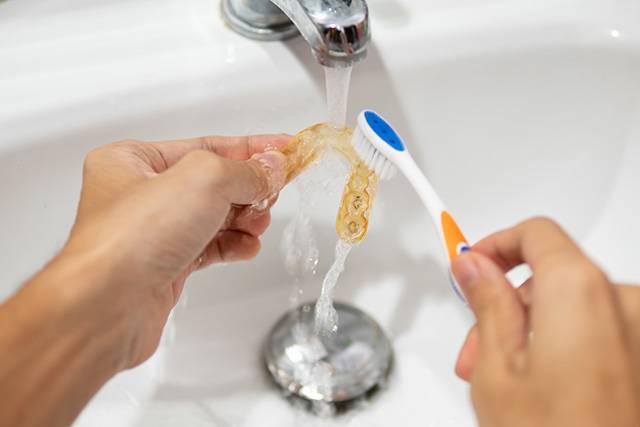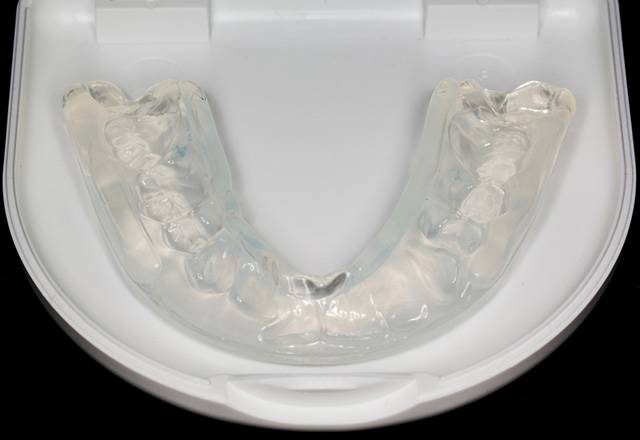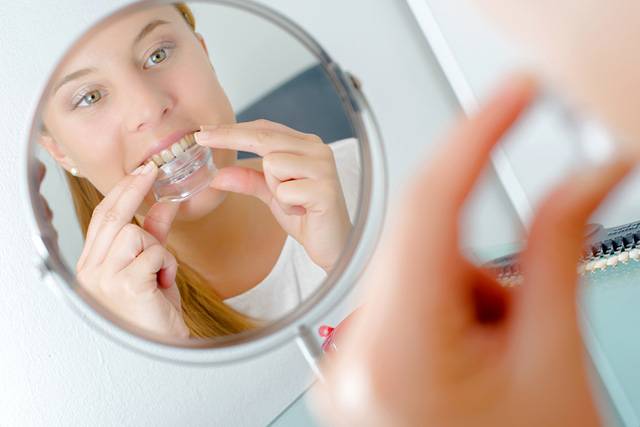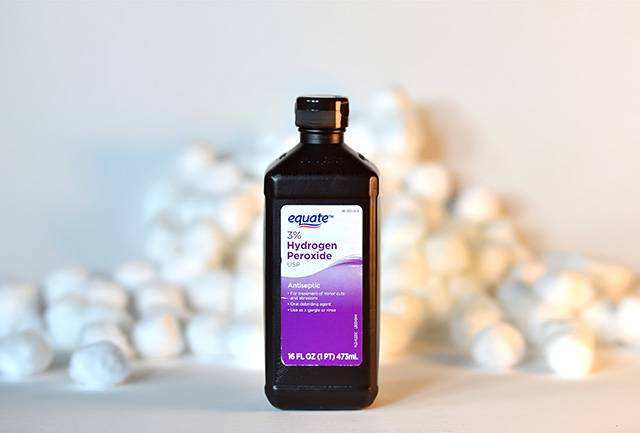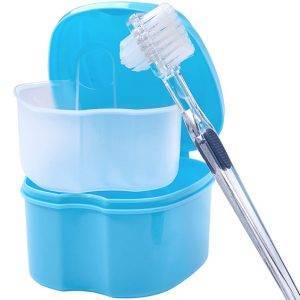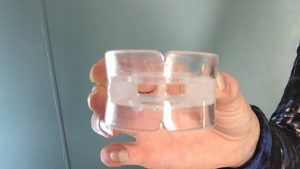
You may be interested in: How to Clean a Dental Mouthguard
On Mouthguards and Sleep Apnea
Sleep apnea is a sleeping disorder characterized by the breath that repeatedly stops and starts. There are three main types of sleep apnea: obstructive sleep apnea (throat muscles overrelax), central sleep apnea (brain fails to communicate with the muscles responsible for breathing), and complex sleep apnea syndrome (when someone has both central and obstructive sleep apnea).
— Signs
People who have sleep apnea will show a lot of signs and symptoms that vary from one person to another: loud snoring, morning headaches, hypersomnia, insomnia, trouble breathing when asleep, episodes of breath halt while sleeping, dry mouth, etc. When left untreated, sleep apnea can lead to a series of complications, such as daytime fatigue, heart problems, hypertension, type 2 diabetes, liver problems, metabolic syndrome, and others.
Before you understand what a mouthguard can do for people who have sleep apnea, you must first understand what occurs in each of the types of disorders.
— Throat
People who suffer from obstructive sleep apnea do so because the muscles that are located in the back of the throat relax. Since these muscles are responsible for supporting the tongue, the throat’s sidewalls, the tonsils, and the uvula, relaxing them would mean that the airway narrows or closes. As a consequence, you fail to breathe in the necessary amount of air.
— Brain
Subsequently, this leads to other problems: your brain isn’t getting enough oxygen or the oxygen levels in your blood are lower than they should be. As the brain senses that your body isn’t getting enough air, it triggers a danger signal that causes you to briefly wake up so that you can get the air intake needed.
For the most part, people don’t remember these brief episodes of waking, which can be both a good and a bad thing. The good thing is that your sleep isn’t disrupted long enough to make it difficult to fall asleep again. However, because most people don’t remember these episodes, those who don’t share a bedroom with someone might not be aware of the fact that they have sleep apnea.
— Centralized
On the other hand, central sleep apnea is characterized by the brain’s inability to send signals to the breathing muscles. This translates into your body not making an effort to breathe for a while. In these cases, people tend to wake up feeling shortness of breath and might even have problems falling back asleep again.
— How Mouthguards Help
Mouthguards are oral appliances that could help you with your sleep apnea problems as they can push your tongue and your lower jaw forward, which helps make sure that your airway is open. Depending on the model chosen, some mouthguards even have a strap that goes around the head/chin to keep your mouth closed and prevent snoring. A mouth guard to stop snoring can sometimes improve your health significantly.
Since one of the most common symptoms of sleep apnea is snoring, mouthguards can also be used for people who snore because of several reasons. For the most part, boil-and-bite mouthguards aren’t that efficient for people who have sleep apnea because they don’t help your breathing all that much.
On Mouthguards for Bruxism
Bruxism is a condition that people normally refer to as teeth grinding. It can occur when awake or when sleeping, but there are usually different reasons behind each type of bruxism form. It is common for both children and adults to suffer from bruxism, although children normally grow out of it. If you have a mild form of bruxism, you might not even need a mouthguard. A mouth guard for clenching teeth can definitely save you future headaches and dental issues.
You may be interested in: Best Mouth Guard for Teeth Grinding
— Long Term Complications
However, people who have more severe bruxism can end up with long-term complications, such as permanent teeth damage, severe headaches, and jaw disorders. People who suffer from bruxism can show signs of teeth grinding that’s intense and noisy, they can experience tooth sensitivity and pain, soreness in the neck, jaw, and face regions, dull or intense headaches, pain similar to earache, and others.
— Why Teeth Grinding?
While specialists have yet to pinpoint the exact causes of teeth grinding, they do suspect it’s a combination of genetic, physical, and psychological factors. People who have awake bruxism will clench and grind their teeth while being under stress, feeling angry or frustrated, or when they’re feeling very tense. People who have sleep bruxism are suspected to have sleep arousals that cause them to have sleep-related chewing activity.
— Treatment
There are many different approaches to treating bruxism, and mouthguards are a very popular choice of treatment. These are designed to keep the upper and lower teeth separated, so they don’t come in contact with each other when grinding.
— Are Mouthguards for You?
Mouthguards that are designed for people with bruxism are typically for either the upper or the lower part of your teeth, and rarely for both. However, there are certain cases where doctors may recommend them for both sides. Even if models differ, their basic structure is the same. They are dual-layered products that have a softer top layer which is perfect for making a teeth impression, and a harder bottom layer that can prevent your teeth grinding.
Depending on the model that you opt for, some of them might even have slanted fronts which help reduce contact between the gums, lips, and the mouthguard itself.
You may want to read: How to Mold a Mouthguard
Types of Sleeping Mouthguards
The market is filled with all sorts of different mouthguards, but there are three main categories that you should know about:
Stock mouthguards are ready-made mouthguards that are basically a one-size-fits-all type of product. They are not based on taking impressions of a person’s teeth, so they are sold in fairly standard sizes. People have a lot of different opinions on the efficiency of these types of mouthguards, but a lot of people buy them because they are the cheapest option out there.
Boil-and-bite mouthguards are products that have some degree of customization and are often compared with athletic mouthpieces. For the most part, these oral appliances are made from some type of thermoplastic material that softens when submerged in boil water, making it easier for you to customize it with a firm bite. The process is pretty similar across different types of brands, as most of them require that you boil some water in the microwave, dip the mouthguard in the hot water afterward, leave it for a few moments, remove it, bite down on it, and you’re good to go.
Custom-made mouthguards are the best, yet the most expensive solution of them all. They are created uniquely for every individual person. Your dentist can make an impression of your teeth and then send that impression to a lab specialized in making such products. Because they are made to fit your precise teeth configuration, they are comfortable and yield the best results, but can sometimes cost up to hundreds of dollars.
Mouthguard for Sleeping Shopping Considerations
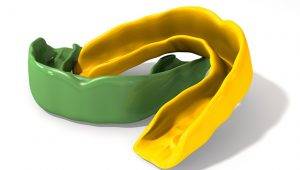
- Establishing a budget for your mouthguard is important because there is a huge difference between the cost of a stock piece and a custom-made nightguard. Stock models can be purchased for as low as $20, but a custom-made mouthguard can cost up to $500.
- Look for mouthguards that come with protective cases. Your mouthguard will need to be rinsed every day and will require deep cleaning at least once per week. It’s really important for your mouthguard to have a sterile environment where it stays, in order to avoid airborne bacteria from eventually ending up in your oral cavity. Looking for a mouthguard that already comes with a protective case means one less purchase for you to worry about.
- If you’re short on cash and want to buy a stock mouthguard, make sure that you look for one that’s trimmable. Even boil-and-bite mouthguards should be able to be trimmed because even if you can adjust the mouthpiece to fit your own dental needs, it might still be too long and end up hurting your inner cheeks. Trimmable mouthguards should be able to easily be cut using a pair of custom scissors. Custom-made mouthguards, on the other hand, are made-to-fit products, so they will not require any trimming.
- Cleaning your mouthguard on a regular basis is super important, so when you’re out buying a nightguard, you might also want to look for cleaners. These cleaners usually come in the form of effervescent tablets that will quickly dilute in water, creating a formula for you to soak your mouthguard in and allow it to remove plaque and other contaminants.
- It is quite usual for some manufacturers to provide mouthguards that are available in multiple sizes, such as individually-sized for men, women, and children. While it is pretty obvious that a child needs a much smaller mouthpiece compared to that of an adult, men and women might also need different-sized mouthguards.
Cleaning a Mouthguard
This is a very important chapter related to mouthguard as these oral appliances are prone to plaque, bacteria build-up, and should be cleaned on a regular basis. Whenever you remove your mouthguard in the morning, you should proceed to rinse it with warm water. Be really careful with the temperature of the water because it can warm the material, especially if it’s a boil-and0bit mouthguard which is sensitive to really high temperatures. Rinsing the mouthguard each morning will make sure that any loosed plaque and debris are also washed away.
— Brushing
Whether you use your regular toothbrush or buy one that’s exclusive for mouthguard cleaning, brushing your nightguard is a great way to keep it clean. You don’t really have to use toothpaste, as its abrasive nature might scratch the surface on your nightguard and shorten its lifespan.
— Keep it Safe
As mentioned before, it’s a really good idea to have a protective case for you to store your mouthguard. But you also need to make sure that your mouthguard is completely dry before storing it in that case. Otherwise, you would be allowing the piece to stay in a concealed and humid environment, which could favor the appearance of all sorts of unwanted bacteria.
— Storage Tips
You can store the mouthguard on a clean surface to allow it to completely dry, and that usually doesn’t take longer than 30 minutes. Whenever the mouthguard isn’t out to dry or in use, it should always be inside the protective case. It’s also a good idea not to leave the case in a humid environment, such as the bathroom. Mouthguards are best stored inside the bedroom, perhaps in your nightstand, so you will always have them nearby when getting ready for bed.
— Go Deeper
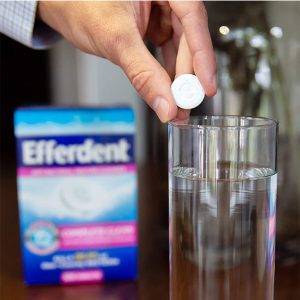
The former option comes in the form of tablets or crystal powders that dissolve in water, creating a solution for dipping the mouthguard and allowing the mixture to do its thing. For the most part, these tablets are quite inexpensive and they come in large boxes that will provide supplies to last you for months.
— Solutions
People that like to make their own oral appliance cleaning solutions will typically create a mixture of hydrogen peroxide and vinegar. This distilled mixture is also efficient for you to dip your mouthguard in and allow it to stay there for about half an hour. After that, you can rinse it and make sure that you leave it out to dry.
— Don’t Forget the Case
It’s also very important to keep the case clean. This is something that some people might tend to neglect, but it is practically useless to care so much for a mouthguard and clean it every day if you’re just going to keep it in a dirty case. Since most of these protective cases are made from some sort of plastic, you can use some mild dish soap and a wet cloth to clean them. Also, make sure that you dry them completely before putting the mouthguard inside for storage.
You may want to read also: Best Mouth Guard Cleaner
Conclusion
Mouthguards are oral appliances that have multiple uses, depending on the type of problem you want to treat or what you’re looking to prevent. Often used as a safety measure for people who practice sports that could get the injured, mouthguards have gained a lot of popularity. However, sleeping mouthguards are a completely different story, because they are used as treatment or prevention plans for certain problems.
These appliances are used by people who suffer from sleep apnea and need this device to push their jaw forward and facilitate air intake. They are also good for people who grind their teeth at night, as they can help prevent contact between the upper and the lower teeth. Whatever the case, always know which mouthguard is better suited for your sleeping needs and make sure that you invest in cleaning your mouthguard every day.

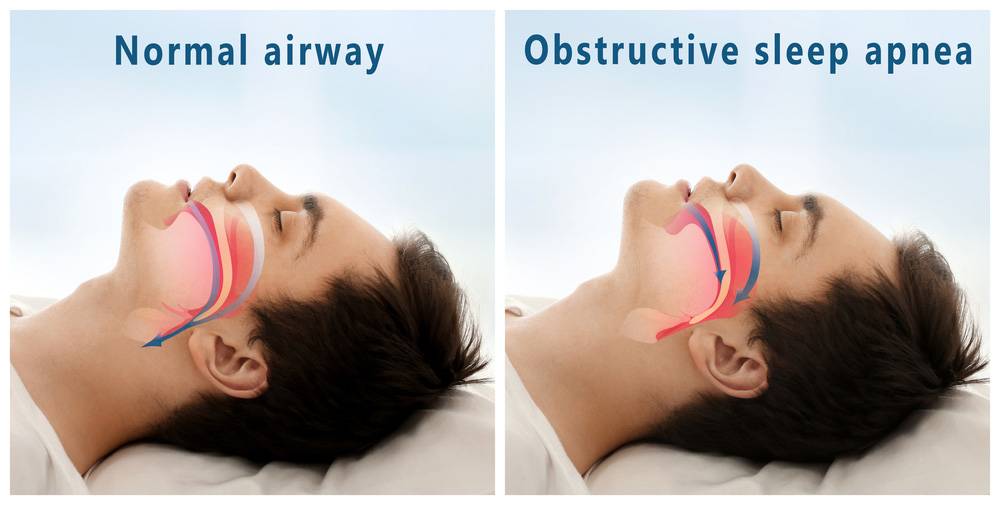


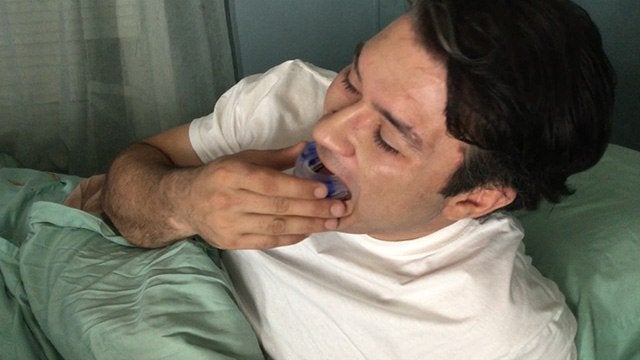
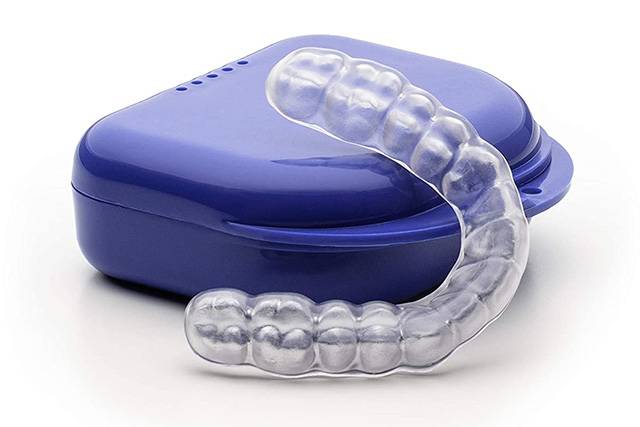
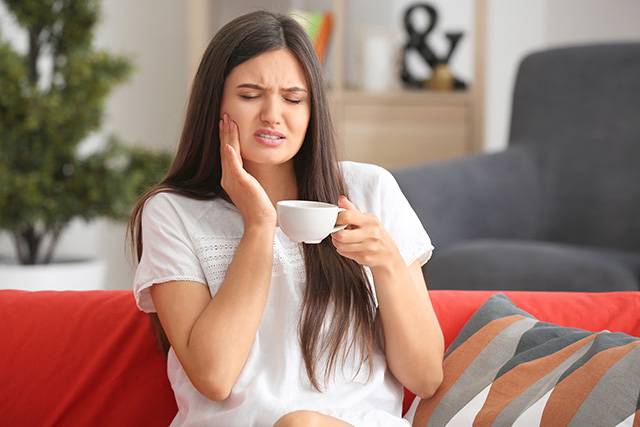

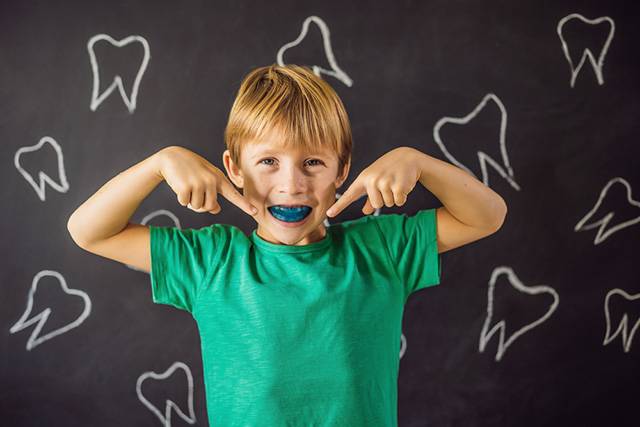
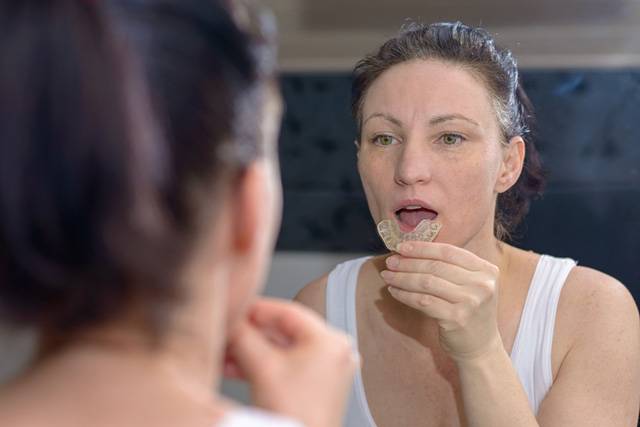
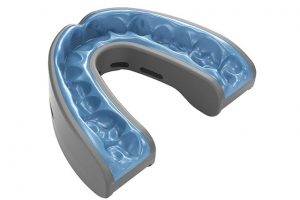 Stock mouthguards are ready-made mouthguards that are basically a one-size-fits-all type of product. They are not based on taking impressions of a person’s teeth, so they are sold in fairly standard sizes. People have a lot of different opinions on the efficiency of these types of mouthguards, but a lot of people buy them because they are the cheapest option out there.
Stock mouthguards are ready-made mouthguards that are basically a one-size-fits-all type of product. They are not based on taking impressions of a person’s teeth, so they are sold in fairly standard sizes. People have a lot of different opinions on the efficiency of these types of mouthguards, but a lot of people buy them because they are the cheapest option out there.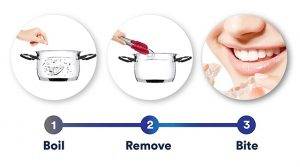 Boil-and-bite mouthguards are products that have some degree of customization and are often compared with athletic mouthpieces. For the most part, these oral appliances are made from some type of thermoplastic material that softens when submerged in boil water, making it easier for you to customize it with a firm bite. The process is pretty similar across different types of brands, as most of them require that you boil some water in the microwave, dip the mouthguard in the hot water afterward, leave it for a few moments, remove it, bite down on it, and you’re good to go.
Boil-and-bite mouthguards are products that have some degree of customization and are often compared with athletic mouthpieces. For the most part, these oral appliances are made from some type of thermoplastic material that softens when submerged in boil water, making it easier for you to customize it with a firm bite. The process is pretty similar across different types of brands, as most of them require that you boil some water in the microwave, dip the mouthguard in the hot water afterward, leave it for a few moments, remove it, bite down on it, and you’re good to go.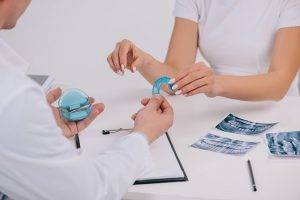 Custom-made mouthguards are the best, yet the most expensive solution of them all. They are created uniquely for every individual person. Your dentist can make an impression of your teeth and then send that impression to a lab specialized in making such products. Because they are made to fit your precise teeth configuration, they are comfortable and yield the best results, but can sometimes cost up to hundreds of dollars.
Custom-made mouthguards are the best, yet the most expensive solution of them all. They are created uniquely for every individual person. Your dentist can make an impression of your teeth and then send that impression to a lab specialized in making such products. Because they are made to fit your precise teeth configuration, they are comfortable and yield the best results, but can sometimes cost up to hundreds of dollars.